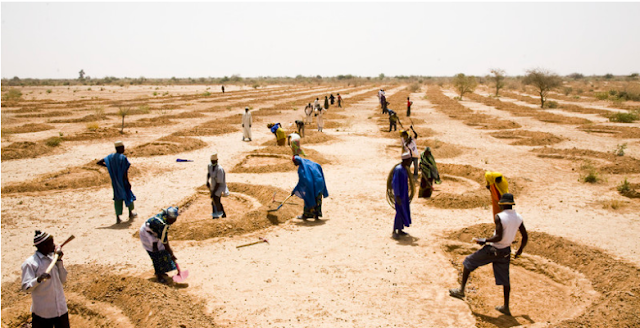Zenvus: Nigeria's Techology Farming
Agro-Ecological Technologies:
A
major focus for many small-holder farmers is risk prevention. New technologies,
focusing on increasing yields, and reducing wastage reduce risk of capital loss
for farmers.
Nigeria's
food security is dwindling, with a growing reliance on food imports to keep up
with the rapidly increasing population. Agro-ecology offers a solution to
agricultural issues within Africa, by achieving
crop productivity without having a profound effect on the surrounding
environment and polluting ecosystems. It reduces farmers reliance on external
factors such as government finance. A consequence of embracing the 'Green
Revolution' strategy, to improve cereal production through the intensification
of land production per area, has led to a reduction in fallow periods,
exacerbating the soil and therefore decreasing overall soil nutrients, in turn
effecting human health.
Information
Communication Technologies (ICT) enhances agricultural development. The figure
below demonstrates the diverse roles of ICT in agricultural development,
produced by the Food and Agriculture Organisation of the United Nations (FAO)
and International Telecommunications Union (ITU) in 2016.
In
order to enhance ICTs role in agriculture, more involvement of farmers is
needed, in the contribution of knowledge
and design. Participatory communication will encourage farmer
collaborations.
Zenvus is a precision farming start up created
by Ndubuisi Ekekwe in Nigeria. A new direction in technology for farming is
'precision farming', aimed at reducing risk. Water scarcity will threaten
crops, declining soil quality and biodiversity loss including critical crop
pollinators.
Zenvus
uses proprietary sensors to collect data from the soil, such as moisture, pH
and nutrients levels. From this it advises the best forms of irrigation and
fertiliser to use. An added camera also helps to detect pests and diseases. The
data is easily accessible to those with a mobile or desktop via the internet,
with mobile phone companies intensively
invested in Nigeria's booming population of over 190 million to increase
the number of mobile users.
Is
technology the future for efficient irrigation?
Technology
is always at the heart of any irrigation scheme, usually for lifting
and distributing the water. Technologies mostly focus on increasing yields,
however this is often not a concern for many subsistence farmers, who's main
goal is to ensure food and decrease risk. Modern technologies that use mobile
phones for connectivity are a smart way to inform farmers and encourage
learning and collaborations between them. However, some factors may inhibit the
application of these technologies, such as lack of electricity in rural areas,
poor ICT skills. A possible solution to the latter, would be to conduct
community learning centres for such technologies to ensure the best possible
outcome.




Comments
Post a Comment